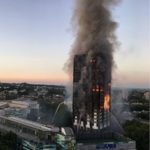 Many of us watched in horror as the flames raced up the 24 stories of the Grenfell Tower in London, as firemen desperately tried to find and save individuals in the dense smoke, and where the death toll is now 79 (and may still be rising). Much has been written about this already, and with the inquiries now launched, more will be written. We will, hopefully, find out the details of this particular infrastructure failure. In the meantime there are two areas to consider.
Many of us watched in horror as the flames raced up the 24 stories of the Grenfell Tower in London, as firemen desperately tried to find and save individuals in the dense smoke, and where the death toll is now 79 (and may still be rising). Much has been written about this already, and with the inquiries now launched, more will be written. We will, hopefully, find out the details of this particular infrastructure failure. In the meantime there are two areas to consider.
1. Technical issues and organisation (this is probably our first departure point).
“Sprinklers would have saved lives. Fire stops that should have protected the internal means of escape may have been faulty or missing. The gas supply lines are under suspicion. The Grenfell Action Group had presciently warned of a lack of fire safety instructions. 999 operators fatally stuck to the official advice that people should stay in their homes, which makes sense when the building regulations are doing their job of containing fires within a single flat, but not when the whole building is engulfed. Compartmentalised thinking – the inability of any one agency to see the whole picture – played a role. It’s likely, as often in major disasters, that it was the cumulative and multiplying effect of several factors that made it so terrible.” Guardian columnist, Rowan Moore
cf. Post on The Titanic and Apollo 7 on June 13
2. Social Attitudes
“I have sat in council meetings where comments from leading majority councillors have shown a total lack of empathy or even respect for those not born to a world where basic human comforts and a good education are givens. I have heard – and noted – comments stating that social tenants should simply move away if they don’t like what they’ve been “given”. As if social housing was not a public good but some kind of privilege to which they are not really entitled. Alongside this has been a slow but deterministic programme of privatising and monetising public assets such as schools, libraries and community and public space.” Local Councillor, Emma Dent Coad, writing in The Guardian
cf Post on Gentrification in Infrastructure and Progress June 16.
.

The use of non-compliant building materials is an indicator of the low capacity of, and political support for, the regulatory bodies. This undermines the rule of law and opens up the possibility, unfortunately evident in the UK in this event, of man made disasters with high risk to the credibility of the institutions of state.
I think the link Kerry makes between unacceptable outcomes (the disasters throughout this post and the two earlier ones to which it refers) and credibility gets to the crux of things.
When I read about each of the disasters, what struck me was that with the benefit of hindsight, none of the organisational / community leaders who had their eyes off such risks and on other things would have found them acceptable.
Our challenge, then, is to make such risks / potential outcomes more visible… and perhaps, in part, to look at how we equip technical decision makers with the authority / responsibility to manage them. This comes back to Gregory’s comment on the 31 May post: “Where we employ people to use their judgement they should be allowed to do so”.
Looking at the O-ring disaster for the Shuttle Program, there is clear evidence that the issues and failure modes were well understood and reported to management. Infrastructure failures quite often have “intentional blindness” at their core. A “belief” in continued function rather than rational risk-based assessment. In the face of management “acting on faith” despite engineering reports that indicate contrary action, what should be done? When does one “blow the whistle” given the negative impacts suffered by whistle-blowers?